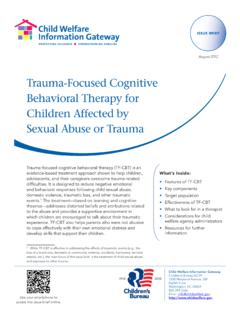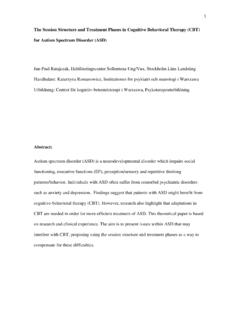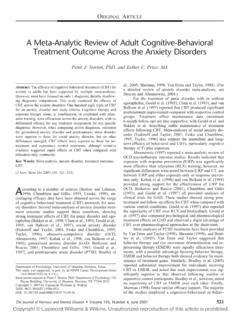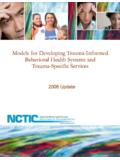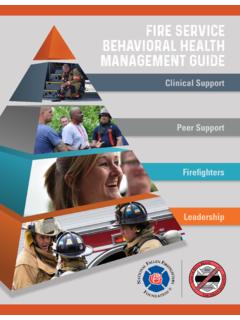Transcription of Moral Reconation Therapy (MRT) - NRCPFC
1 Moral Reconation Therapy (MRT)i The purpose of this document is to provide a brief overview of Moral Reconation Therapy based on the information available in The Substance Abuse and Mental Health Services Administration's (SAMHSA) National Registry of Evidence-based Programs and Practices (NREPP). The content presented in this brief was retrieved from SAMHSA's NREPP. For detailed descriptions of the outcomes and research mentioned, the quality of research rating, full program information, and a list of studies reviewed, visit What is it? Moral Reconation Therapy (MRT) is a systematic treatment strategy that seeks to decrease recidivism among juvenile and adult criminal offenders by increasing Moral reasoning. Its cognitive-behavioral approach combines elements from a variety of psychological traditions to progressively address ego, social, Moral , and positive behavioral growth.
2 MRT takes the form of group and individual counseling using structured group exercises and prescribed homework assignments. The MRT workbook is structured around 16 objectively defined steps (units). focusing on seven basic treatment issues: confrontation of beliefs, attitudes, and behaviors;. assessment of current relationships; reinforcement of positive behavior and habits; positive identity formation; enhancement of self-concept; decrease in hedonism and development of frustration tolerance; and development of higher stages of Moral reasoning. Participants meet in groups once or twice weekly and can complete all steps of the MRT program in a minimum of three to six months. Who is it for? What presenting problems does it address? Adolescents (ages13-17), young adults (ages 18-25), and adults (ages 26-55) with issues related to crime/delinquency and/or social functioning.
3 What outcomes are addressed in the research? 1. Recidivism 2. Personality functioning How much does it cost?*. *The following information may have been updated by the developer and may not reflect the current costs or availability of items. Check with the implementation point of contact for current cost information and implementation requirements. 1. MRT client workbook: $25 per participant 2. On-site initial training (includes quality assurance tools and services): varies 3. On-site consultation: $450 per day 4. 4-day, off-site initial training (includes quality assurance tools and services): $600 for first person, $500 for each additional person from the same agency 5. 2-day advanced training: $300 per person 6. Video consultation: $150 per session August 2013. For additional information and resources on Moral Reconation Therapy , visit: SAMHSA's National Registry of Evidence-based Programs and Practices: Moral Reconation Therapy (MRT).
4 Correctional Counseling, Inc. (CCI). Moral Reconation Therapy Implementation & Research: Kenneth Robinson, (901) 360-1564 Department of Health and Human Services, Substance Abuse and Mental Health Services Administration. (2013). Moral Reconation Therapy . National Registry of Evidence-based Programs and Practices. Retrieved on 8. April 2013 from August 2013.

